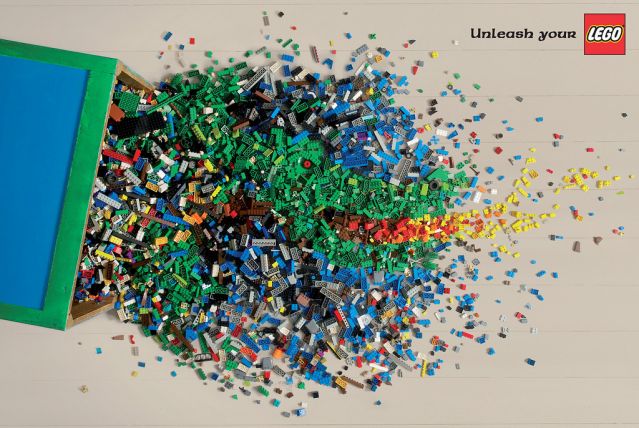Creativity
Building With LEGO Kit Instructions Makes Kids Less Creative
Study shows the 'mindset' of LEGO kit building hurts creativity on next tasks
Posted June 16, 2015

A paper in the Journal of Marketing Research by Page Moreau of the Wisconsin School of Business and Marit Gundersen Engeset of Buskerud and Vestfold University in Kongsberg, Norway asks a question we've all pondered at some point: Is it better for kids to free-build with LEGOs or to follow the instructions of kits?
Moreau and Engeset frame the question in terms of mindsets—"Recent research on mindsets has demonstrated that an individual's behavior or thought processes in one situation can influence their thoughts and behaviors in later, unrelated tasks," they write.
Basically, the gist of a mindset is that your brain is like a giant shipping barge that takes two miles to turn or stop; if you set it in a certain direction, the mindset spills over into whatever comes next. So the question is, how does the mindset of kit-building or free-building spill over into a child's creativity?
Let's get to the science.
In the first experiment, Moreau and Engeset stuck 136 undergrads in the lab, had them free-build or kit-build with LEGOs, and then measured their performance on tests that either required or didn't require creativity. Specifically, after building they had them solve 25 analogies ("well-defined" problems, with set rules and each with only one correct answer) or draw and title small doodles, starting with a couple squiggles to spark the imagination ("ill-defined" problems, with almost no rules and infinite "answers").
Here's how they describe the results: "Participants tackling the well-defined problem [kit building] received a lower creativity score than those solving the ill-defined problem [free building]...participants in the well-defined condition scored lower on both originality and abstractness than their counterparts in the ill-defined condition."
In other words, following the instructions of a LEGO kit undercut participants' ability to be creative in subsequent tasks. Chalk it up to mindset: "building with a LEGO kit with instructions puts you in the mindset to solve well-defined problems, which makes it harder to solve ill-defined problems," Moreau says.
Interestingly, the reverse wasn't true. People who free-built were no worse at analogies; practicing this ill-defined problem didn't hurt people's ability to solve well-defined problems.
Along with the researchers, let's take it a step further: What happens if we pull the step-by-step instructions, but let people look at the picture of the finished kit on the box? That's what Moreau and Engeset did, this time with 137 undergrads, after which they asked these collegiate LEGO builders to brainstorm as many uses as they could for a paperclip (an ill-defined problem and a common test of creativity called "Guilford's Unusual Uses Task").
In this experiment, "participants who were given a picture of the outcome in the first task produced less original uses for the paperclip as compared to those who did not receive a target outcome...providing further empirical support for our claim that well-defined problems create a mindset that carries over to impair divergent thinking," they write.
It's a pretty clear-cut finding: LEGO kit-building makes people less creative.
Of course, there's a ton of grey area in the interpretation of this finding. How long does this non-creative mindset last? Can enough kit building permanently change a person's overall level of creativity? Does this finding hold in kids or adults, or is it specific to undergrads? (Perhaps an artifact of BAC at time of testing?) Does kit-building have benefits outside creativity that overbalance the cost, maybe in focus or conscientiousness or willpower or grit? Are toy manufacturers conspiring to sheepify our children in a clandestine plot for total world domination?
We've seen how free- and kit-building affects builders' ability to reach a defined goal, namely creative expression. But what about choosing goals to pursue in the first place? That's the subject of the last of the Moreau-Engeset experiments in this paper, in which they flipped the workflow of testing and building—this time, they had subjects do ill-defined or well-defined problems and then choose how to build with LEGOs. Overall 44 percent of people chose to build by following kit instructions, with the other 56 percent choosing to free-build.
If you had to guess, what percentage of the people who first did well-defined problems —a word search, a letter find, a number find, and a coloring task—do you think went on to choose kit-building? How strongly did putting people in a well-defined mindset carry over to subsequent choices and the goals that people set for themselves? In this experiment, a full 67 percent of subjects put in a well-defined mindset went on to choose the well-defined LEGO building task (again, compared to only 44 percent of people who had, for example, been shown a picture of a stuffed bunny and asked how they would make it more fun to play with).
To Moreau and Engeset, the implications of these findings go beyond LEGO.
"Rather than using a map along with trial-and-error to find our next destination, we can now ask Siri to guide us seamlessly to that location; instead of following an Italian recipe, we can now sauté a Bertolli ready-to-cook frozen meal for dinner, and instead of struggling to retrieve an answer to a question from our memory, we can instantaneously Google the information. The marketplace essentially offers more products that engage us in well-defined problem-solving. The goal of this paper is to better understand the downstream consequences of engaging in this type of behavior," they write.
If you take these experiments at face value, the "better understanding" of this research is that the more we are confronted by and complete well-defined problems like LEGO kits or word finds or color-in-the-lines pictures, the less we choose to engage in and the worse we are at solving ill-defined problems: create something beautiful, discover something meaningful, find someone to love.
Now, just for a few minutes, I'm going to close my eyes and listen to the sound in my memory of a hand running through a trunk of LEGO blocks. You know what? I think I can smell them, too.




